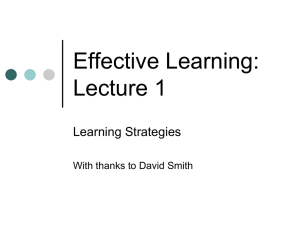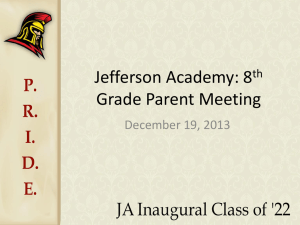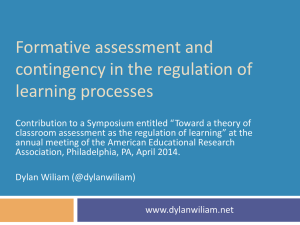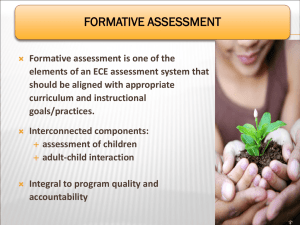Assessment and Feedback in Geography - Kevin Rees
advertisement
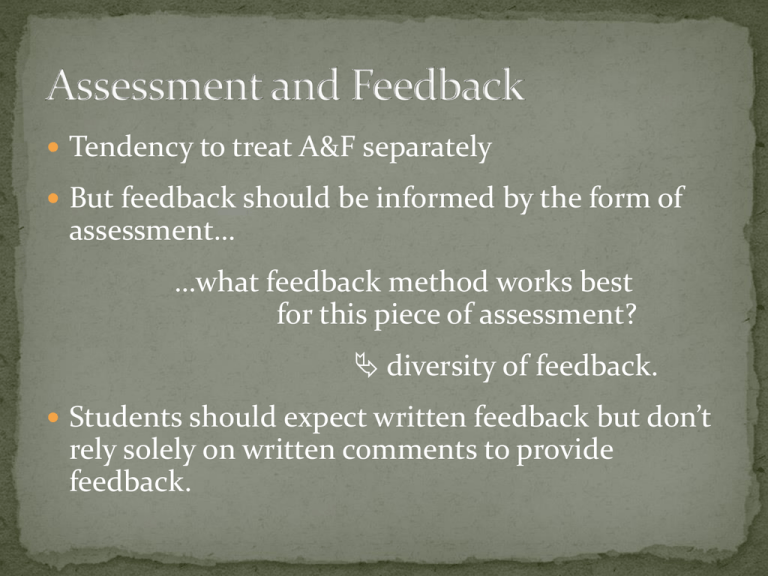
Tendency to treat A&F separately But feedback should be informed by the form of assessment… …what feedback method works best for this piece of assessment? diversity of feedback. Students should expect written feedback but don’t rely solely on written comments to provide feedback. Diversity of assessment Coordinated assessment approach Assessment calendar (College of Science system) Spread of assessment Early assessment Small assessment: Balanced assessment (for learning): Choice of assessment Diversity of assessment … makes a positive difference to the engagement of students in the assessment and feedback process. Exams but also continual assessment in the form of: Essays Posters practical reports seminar presentations Fieldwork notebooks, field guides maps production Frequent formative assessment and feedback through frequent (biweekly) tutorials /essays “I found the best thing about the (tutorial) module to be the close work with the tutor in relation to getting the best out of essay writing. I enjoyed writing the essays and then getting feedback to work on”. “Out of the four essays that have to be submitted, only the two best essays go towards your overall mark. This is good as it allows you to work on certain areas that need improving.” Diversity of assessment … makes a positive difference to the engagement of students in the assessment and feedback process. Exams but also continual assessment in the form of: Essays Posters practical reports seminar presentations Fieldwork notebooks, field guides maps production and feedback through frequent (biweekly) tutorials /essays Biweekly practical classes provide prompt and frequent feedback Summative assessment (Continual Assessment increases through degree, which provides earlier feedback than exam period) Project assessment (Dissertation support from Level 2 via tutor and peer system) Students tell us they appreciate “I like the assessment, the presentation was a good experience” “Take the use of presentations into other modules, even instead of exams”. “The seminar put many out of their comfort zones and pushed us to develop ourselves overall.” “Having to do a presentation to the class. It was scary but it was a useful thing to do and the feedback after was really helpful.” Diverse assessment also helps students of differing abilities shine: “The presentations are a great opportunity for those of us who can explain our knowledge better with words than on a piece of paper.” Coordinated assessment approach: Form (we expose students to different methods and forms of assessment; assessment methods communicated preselection) Frequency Timing Stress a course rather than modular perspective. Assessment calendar (College of Science system) available for all students to see and plan their time. submission dates coordinated by teaching administrator. Coordinated assessment approach: Form (we expose students to different methods and forms of assessment; assessment methods communicated pre-selection) Frequency Timing Stress a course rather than modular perspective. Assessment calendar (College of Science system) available for all students to see and plan their time. submission dates coordinated by teaching administrator. Spread of assessment points of assessment spread across academic year to avoid assessment congestion. Early assessment earlier points of assessment in TB1 provide feedback for learning crucially allows feedback before student surveys. Level Two Modules with continual assessment components Teaching Block 1 7 Teaching Block 2 7 Level 3 Teaching Block 1 7 Teaching Block 2 12 Compulsory dissertation (at L3) has formative and summative assessment in TB1 and TB2, so everyone gets feedback. Small assessment: small, quick to mark, low % module contribution (low risk) early and individualised feedback which students appreciate. E.g. Geographic Information Systems: 5% mapping assignment Due October 25th Feedback on November 2nd Individual and group feedback Group feedback emailed to all students by module coordinator: Well done - everyone passed. We have marked in 5% categories, which equates to 1% for the overall module mark as this piece of work is worth 5% of the total. The minimum was 50% and the maximum 80%. On the whole you all appear to have grasped the nature of good mapping, and some of you have demonstrated considerable flair. Common problems included: 1) Lack of geographic reference (e.g. graticule, grid or inset map). 2) Unsympathetic colours, scale or layout. 3) Failing to completely address the specification. 4) Lack of information to explain what is being presented. Best wishes. Balanced assessment (for learning): • Risk of assessment burden and assessment fatigue (for students and staff ). • Regular points of assessment across the course • Frequent student experiences of feedback. Choice of assessment: • students appreciate choice (selection from choice of essays; essay or more technical assignment; choice of data set). “Module was very interesting, especially the seminars and coursework idea of choosing from a list”. Diverse feedback methods Exam feedback Contextualised feedback Early feedback Frequent individualised formative feedback (project) Communication Pre-emptive feedback Diverse assessment justifies diverse feedback methods: students get bored with the same method of feedback. combine written feedback with: Feedback using a rubric which reflects your marking guidelines Anon Marketing Sustainable Tourism 31/5/2012 Additional comments for feedback: A visually appealing poster with reasonable structure and flow (organisation). What is the research question? The context section needs references. Methods lack detail. Curiously the research describes attractions rather than focusing on their marketing. An odd discord between the title and the research. Diverse assessment justifies diverse feedback methods: students get bored with the same method of feedback. combine written feedback with: Feedback using a rubric which reflects your marking guidelines Oral feedback (tutorials, after seminar presentations) Peer feedback (in seminars, group work at Level 2, DSG for dissertation at Level 3). Exam feedback: At every level students receive individual meetings with their tutor in February and October personalised feedback. Students see their scripts read the comments discuss strengths and weaknesses devise objectives for improvement. Contextualised feedback Individualised feedback complemented by… …Generic feedback (common strengths/weaknesses) How do I compare to my peers? What did I do better and worse than my peers? provides context encourages reflective learning Early feedback early and prompt feedback for learning We do this through: our tutorial system research methods module in various topic-specific modules. Frequent individual formative feedback E.g. Dissertation (project assessment) L2 tutor provides feedback on proposal Allocated staff mentor adds further feedback on proposal L3 mentor provides formative feedback in regular meetings DSG peer-group also provides formative feedback Feedback on project progress in November Feedback chapter(s) in December Communication Feedback calendar to accompany an assessment calendar (manage expectations). Monitoring and notification by our Teaching Administrator Blackboard to give generic feedback to all students in a module. Return of work with feedback whenever possible (Sharepoint to store electronic work for review by external examiners). Trialling Grademark in semester 1 AY2012-13. Pre-emptive feedback Ensure students are aware of the standards expected of them: what does 1st class work look like? Can they assess their peers? Reviewing past exam essay answers (anonymised) to students to read, award a mark, justify and discuss. More than providing a model answer, it promotes reflective-learning. Final thoughts: Some practices are serving us well … but there is still room for improvement. Improving student feedback scores remains a top priority. Our subject provides for a large variety of assessment methods … best solution likely to be subjectspecific. A College system has been helpful: assessment calendar has assisted coordination and oversight.

